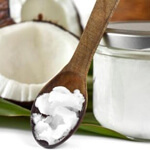 Coconut oil, which is derived from the meat of matured coconuts, is possibly the healthiest oil in the world. Rich in good saturated fats and important minerals, the regular consumption of coconut oil has been linked to reduced cholesterol, boosting of the immune system, weight loss, superior digestion and metabolism, and much more. It is, in short, a truly amazing food.
Coconut oil, which is derived from the meat of matured coconuts, is possibly the healthiest oil in the world. Rich in good saturated fats and important minerals, the regular consumption of coconut oil has been linked to reduced cholesterol, boosting of the immune system, weight loss, superior digestion and metabolism, and much more. It is, in short, a truly amazing food.
However, if there’s one department in which coconut oil excels even more than healthiness, it’s versatility. Many people purchase a jar of raw, organic virgin coconut oil (which is the best kind to buy) and simply use it as a health supplement or cooking ingredient. While this is perfectly fine, the oil could be enriching their lives in so many other ways.
Additional Uses for Coconut Oil
Moisturizer – Due to its high amounts of medium-chain triglycerides (fatty acids that deeply penetrate and nourish the skin), coconut oil is a fantastic moisturizer that leaves your skin rejuvenated and sweet-smelling. Coconut oil is most commonly applied to the face once or twice a day, but it can be applied topically to any part of the body that requires rejuvenation or healing (in fact, coconut oil is one of the best home remedies for treating stretch marks).
Sunscreen – While moderate sunbathing without sunscreen is an excellent way to absorb beneficial vitamin D-creating UB-V rays, most people will encounter times when excess sunshine exposure – manifesting as sunburn – is an unwelcome possibility. Fortunately, none of us have to resort to commercial sunscreens and their unpronounceable, cancer-causing ingredients during these times. Coconut oil has an SPF of 10, meaning that it blocks 90 percent of the sun’s UB-V rays. Simply apply the liquified oil to your exposed areas as you would commercial sunscreen.
Toothpaste – According to a study conducted by the Athlone Institute of Technology in Ireland, coconut oil contains compounds that inhibit the growth of many strains of Streptococcus bacteria – the same bacteria that inhabits our mouths and contributes to tooth decay. It also contains tooth whitening properties. This makes coconut oil an excellent ingredient to add to homemade toothpastes. It is especially potent when mixed with baking soda, powdered egg shells (for an optimum calcium-magnesium ratio), xylitol, essential oils such as peppermint and cinnamon, and a sprinkle of sea salt.
Conditioner – Coconut oil is one of the greatest gifts you can give your hair. Its rich tapestry of fatty acids and antioxidants, coupled with its unique molecular structure that aids absorption, makes it a fantastic natural alternative to commercial conditioners, which can leave your hair looking shiny and healthy. Simply heat two teaspoons of coconut oil until it is liquid and massage it around your scalp to encourage blood circulation. Leave it in for as long as you can before rinsing it off with warm water.
Deodorant – Finally, coconut oil can also be used to make an effective natural deodorant due to its noted antifungal and antibacterial properties. Though some people have reported good effects using coconut oil alone, most natural recipes for deodorant usually incorporate coconut oil and several other ingredients, most commonly baking soda, one or more essential oils and maybe a little organic cornstarch to absorb wetness. Since coconut oil (and any ingredients mixed with it) is solid in its natural state, the deodorant can be applied like an ordinary stick deodorant, ideally first thing in the morning.






